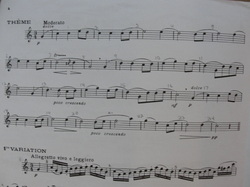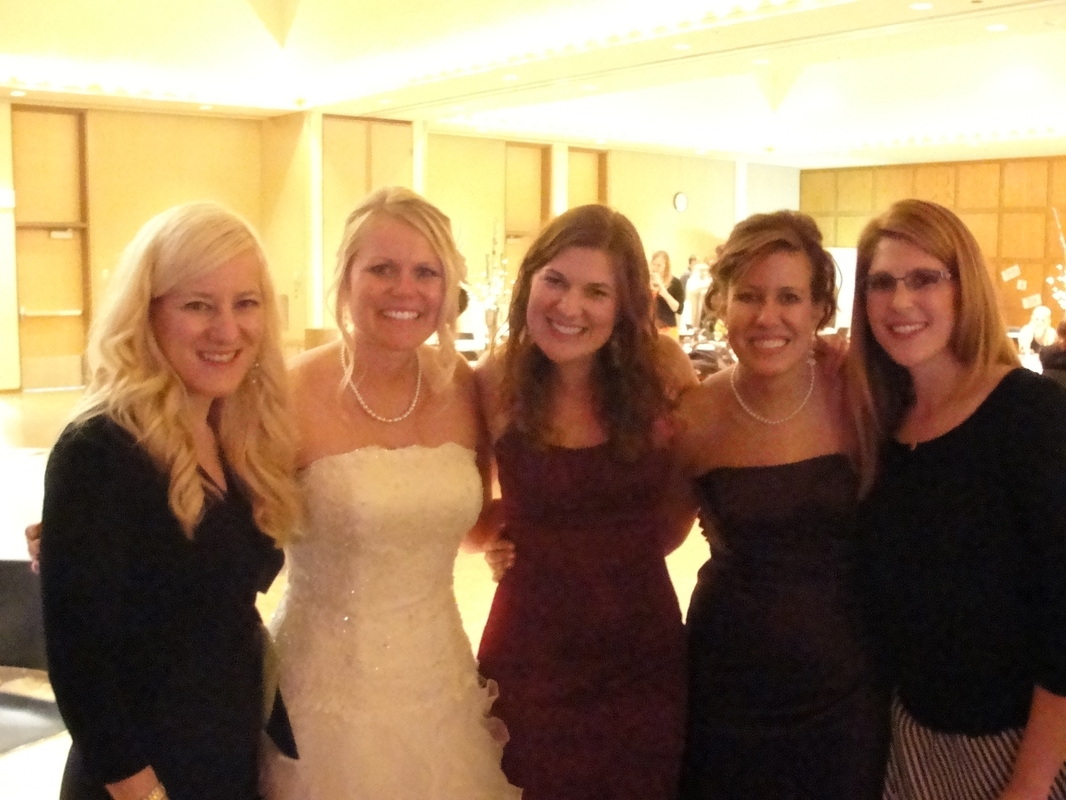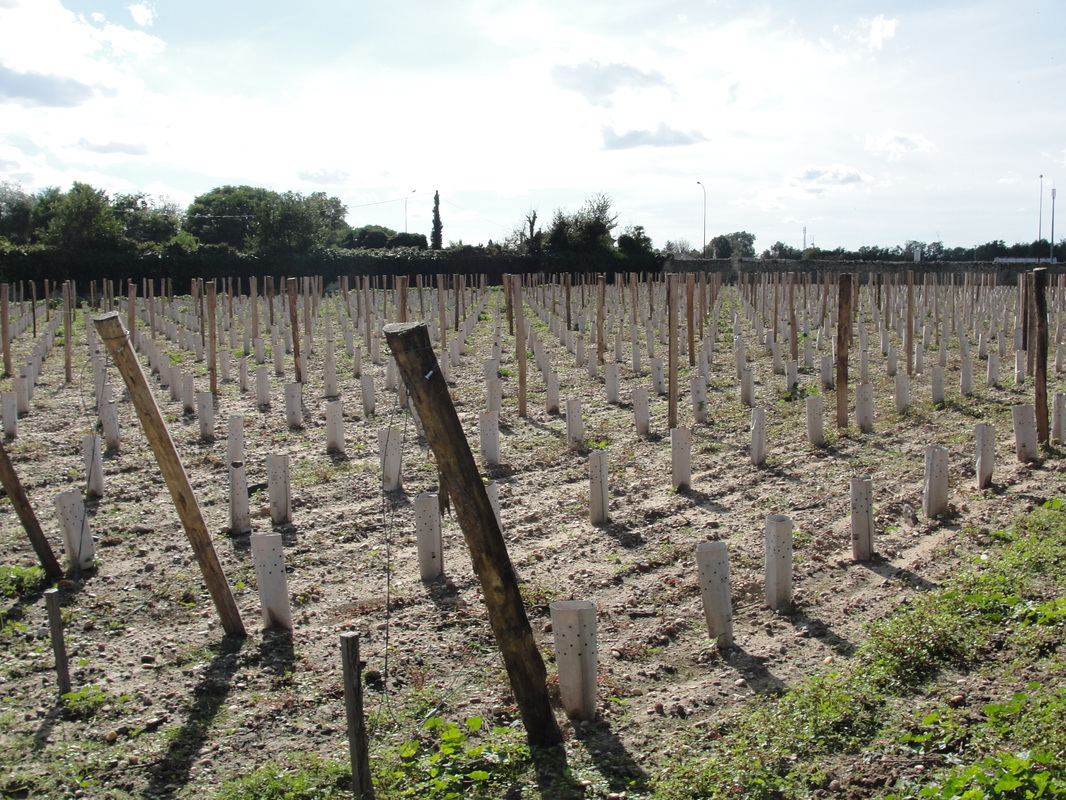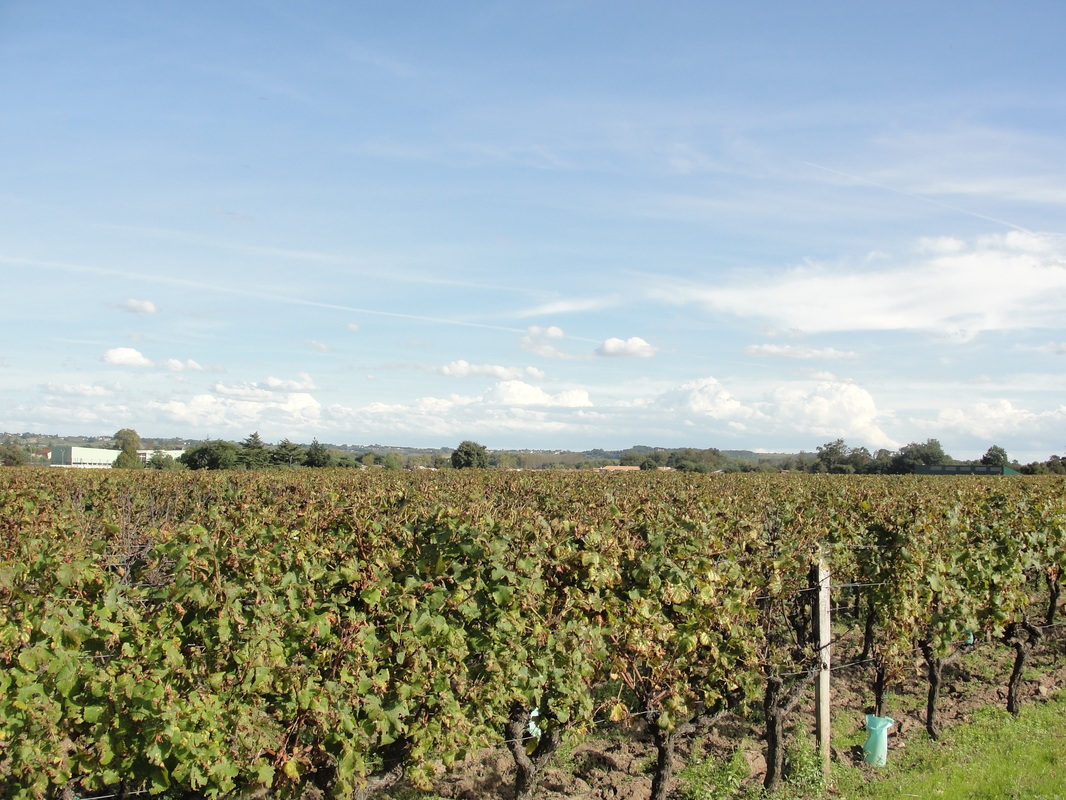
My stand partner Jacques and I before the encore at the clarinet concert.
I returned to France for one final night. In less than 16 hours, I would step off a transatlantic flight, enjoy a fine assortment of French cheeses, tartes and quiches, play in a large concert, say a few more goodbyes, pack most of my possessions into a couple pieces of luggage, sleep an hour and hop on a plane to Berlin.
Even though it was jam-packed, I was thankful to spend one more evening in Toulouse. The concert was the 20th anniversary of the clarinet ensemble, so I got to play with former members of the ensemble and also a guest virtuoso. My French friends were shocked at his improvisation ability. In the Artie Shaw Concerto, he played a lick from "Happy Birthday," and I got plenty of questions about that afterward. Oh, the freedom of jazz music!
A few of my friends who I didn't have the chance to see before I left for Christmas came to the concert. I also saw other friends for one last time (or, until the next time....à la prochaine). I was reminded of just how many wonderful people God put in my path while I lived here.

Some of my many friends who came to my concert. Merci beaucoup !
I didn't start packing until about 10 p.m., but the adrenaline and caffeine helped me to finish the task. I probably spent too much time trying to maximize every last gram of my 23-kg limit, but everything I could bring with me was one less thing to mail.
My roommate Lucy helped me get my luggage from the metro to the airport shuttle. This was no easy task. In the haze of jet lag, I didn't transfer my backpack into my large duffel bag in order to be able to strap it on my back. This meant that the duffel bag was more like a body bag – dead weight!

Yes, it was a little like I had packed a small child in my bag (thanks, Kami, for being my photo illustration from our Kindred days).
Anyways, I barely got my luggage off the bus and into the airport. And if it wasn't for a nice airport employee who watched my luggage while I found a luggage cart, I might have missed my flight trying to kick the duffel bag up an incline to the check-in counter! All things considered, I had a smooth, short transition from the US to France to Germany. Thank you for however you supported me in Toulouse. I won't forget the chapter of my life story written in France. If you want to follow the encore of my French experience in Berlin, Germany, visit my new blog, D. Marie in Germany. Merci et à bientot en Allemagne !
 "Variations Sur Un Air Du Pays D'Oc" was lying on top of my end table when I was looking for clarinet music to practice this summer. I knew I had packed it, but I honestly didn't know much about it.
I played this for a high school contest when the only French I knew was, "bonjour" and "merci." I'm sure my French friends would have been appalled at my Anglicized pronunciation, which would have gone something like, "Vay-rie-ay-shuns suhr unn air doo payz dock."
Now, having lived in France for several months, I knew that pays d'oc was referring to the region of France where Occitan, a dialect, is spoken. Toulouse, the city I was living in, belongs to this language group.
 After doing a bit of research, I learned that the composer, Louis Cahuzac, grew up less than two hours from Toulouse and attended the Toulouse conservatory. This piece was based off of a folk tune, Se Canto, originating in the valley of the Garonne (which is the river that runs through Toulouse). I never imagined that I would get so "close" to this music.
How did this high school musician from Minot, ND end up as a 20-something Christian worker in Toulouse, France? God only knows.
He knew long before I even learned to play a clarinet, that I would be called to serve in France. He knew I would become a part of a beautiful community where I could walk alongside and support nationals, learn French and even be given the opportunity to play in a French clarinet ensemble (with clarinetists and teachers from this very same conservatory).
Already, the variations of my life that God has written astonish me. The timid girl who couldn't even raise her hand to use the bathroom became a high school student who loved performing. That young woman became a college student with three majors, who felt called to lead a team of five strangers playing music and doing relational ministry in the US and South America after she graduated. That fledgling leader got broken of entitlement during a 15-month period of underemployment, started a couple ministries with help from friends, organized some renegade trips to serve in Ecuador and China while working full-time and then left it all to move to France.
Now, in my last years of my 20s, I am off to Berlin to tell the stories of what God is doing as Christians unite to seek the welfare of the city. Do I know what this next variation will bring? Not completely. But I know that God writes some incredibly beautiful symphonies out of our brokenness and weaknesses and that His plans are much more extensive and trustworthy than mine.
"'For I know the plans I have for you,' declares the Lord, 'plans for welfare and not for evil, to give you a future and a hope.'" – Jeremiah 29:11
It doesn't look like much, does it? A bunch of posts and a bit of plant rubble.
It is common knowledge that fine wine undergoes an aging process, but I didn't know until my family and I visited several vineyards in Graves, France, that the plants themselves must also reach maturity.
How long does it take? According to the master of this vineyard in Graves, France, it will take ten or more years for these vines to resemble the ones below. A whole decade? Just to start producing enough grapes for wine? Now granted, once the vines begin producing, they will continue to bear fruit for well over a decade, provided that they are well-tended to and the conditions of the soil and weather patterns are conducive to the grapes' development.
My experience in the vineyard caused me to rethink what Jesus had to say about the vine and the branches.
"I am the true vine, and my Father is the vinedresser. Every branch in me that does not bear fruit he takes away, and every branch that does bear fruit he prunes, that it may bear more fruit. Already you are clean because of the word that I have spoken to you. Abide in me, and I in you. As the branch cannot bear fruit by itself, unless it abides in the vine, neither can you, unless you abide in me. I am the vine; you are the branches. Whoever abides in me and I in him, he it is that bears much fruit, for apart from me you can do nothing." – John 15:1-5
As branches on Jesus' vine, we are dependent upon Him to bear fruit. I cannot bear fruit on my own anymore than a branch of an apple tree can produce an apple when it has been broken off the tree. I am completely dependent on the Gospel of Jesus Christ and the pruning and care of God the Father, the vinedresser, to grow. Apart from Him, I can do nothing.
I have no control of the process either. I can't fast-forward through the years required to grow. It is in God's timing.
The pressure is also off of me. No amount of spiritual discipline is going to expedite growth. All I can do is abide. It is also not dependent on me to make others bear fruit either, for it is God's vineyard. He knows exactly what each branch needs and tends to each one. I can't even come close to his knowledge and care.
So how will anyone know that I am abiding in Christ? By the God-produced fruit in me.
"You will recognize them by their fruits. Are grapes gathered from thornbushes, or figs from thistles?" – Matthew 7:16
The French school of wine-producing is also unique in that they use terroir – that is a sense of place that includes all conditions including geography, geology and climate. Each terroir dictates what variety of grape will best grow there. A vinedresser can't decide one year to grow one kind of grape and try a different one the next year.
This concept of terroir influences how wines our named. All of France is divided in to appellations, literally callings. The names of French wines come from where the vineyard is located. The wine of each region tastes different because of where it was grown.
As Christians, we bear the name of our vine, Jesus Christ. As His strength is manifest in us, we bear fruit – fruit that looks, smells and tastes like the life-giving hope we have in Him. What a privilege it is to bear His name!
 "I quit."
Those of you who know me well know that those words don't often come out of my mouth together. Achievement fuels me. My goals are always before me. I tend to believe that with enough hard work, anything can be accomplished. Once I attain a goal, I am running full speed ahead to the next goal.
In some ways, I am never satisfied. There is always a better way, always room for improvement. It is never finished.
"It is finished." These were Jesus last words before he would die and days later be resurrected. What was finished? In brief, everything Jesus needed to accomplish on our behalf – enduring the agony of our sin and the resulting absence of God's presence, so we would never have to again. However, many Christians (myself included) tend to live as if Jesus forgot to dot a few "i"s and cross a few "t"s. In all of our efforts to look good and have everything together spiritually, our lives are negating Jesus' finished work. In effect, we become the object of our own faith. What does this have to do with embracing and being embraced by Jesus Christ (where I left you at the end of Part I)? Everything. When I was a little girl, the moment my dad walked in the door from work, I was lined up at the end of the entryway ready to run and leap into his arms. I never worried about whether he would catch me or not. I know my daddy was strong enough to hold me and the few joyful moments I would spend in his arms would reassure me of my father's love for me. When we embrace someone, we are also being embraced. And since we know that God is much grander than we are, this embrace is more about being taken up in His arms and resting in Him. Most parents say that their love for their children is immediate. They don't wait for their infants to prove themselves worthy of being loved. They love their children because they belong to them.
In the same way, I (and all who have been claimed as God's children) can rest in our identity in Jesus Christ, the one who has finished what we could not.
So I quit. No more striving. Anything I am doing to prove myself is worthless and, actually, quite disgusting. Because of who I am in Christ and what he has finished on my behalf, I am free to just be.
Consequently, I am practicing the presence of God and transformationally his love releases me to let go of striving. My most recent release was marathon training. I have run one marathon, and I learned so much about perseverance and dependence on God for strength. I wanted to run a second marathon, but one day in the midst of a run, I couldn't go on anymore (granted it was over 90 degrees out). I prayed a half-surrendered prayer, telling God he could stop me if he wanted to (but really, I didn't want him to).
I kept running, thinking I was ok but knowing I wasn't. Deep down, in spite of all my spiritualizing of the race, my real motivation ended in pride. I already have a finisher's medal. There is nothing left to prove.
Once I was convicted that I probably shouldn't keep going (a month later), God took it away. My medical certificate was rejected for not saying "marathon in competition" (mine only said "marathon") and not having the stamp of my doctor (doctors in the States don't have stamps).
Now my goal is to run the race of faith, running toward my savior Jesus who loves me, who has accomplished everything that matters.
"Therefore, since we are surrounded by such a great cloud of witnesses, let us throw off everything that hinders and the sin that so easily entangles. And let us run with perseverance the race marked out for us, fixing our eyes on Jesus, the pioneer and perfecter of faith. For the joy set before him he endured the cross, scorning its shame, and sat down at the right hand of the throne of God. Consider him who endured such opposition from sinners, so that you will not grow weary and lose heart." – Hebrews 12:1b-3
Part III will focus on practicing the presence of Christ and what it means to enter His rest. Until then, I urge you to give up and get going toward Jesus.
 Photo credit: Robert Lawton Photo credit: Robert Lawton Open caskets terrify me. The first one I ever saw was at the funeral of a toddler I babysat for who died suddenly of meningitis. The two-year-old lying in the coffin looked a small child sleeping from a far. When I came closer though, I could see the pasty make-up covering the lifeless face. The bed-jumping, song-singing, wiggling little boy was gone.
The second open casket was the visitation before my grandma's funeral. But it wasn't my grandma I visited. I visited a body, wearing my grandma's clothes, made to look as though she was alive. I don't know what it was about the corpse, but none of us in the family felt like it was her. Maybe it was that she wasn't wearing her glasses. Maybe it was that death had taken the puffiness out of her cheeks. Whatever it was, in that moment, I knew that, while my grandmother's body was still on earth, her spirit had departed. She would never hug me or squeeze my hand like the last time I had seen her alive.
Are you looking alive or fully alive? This was a question posed by pastor and author Alan Kraft at the ReachGlobal Europe conference I attended in Slovenia last month. "Look alive!" is a "cheer" sometimes heard from the stands when the home team is being crushed by the opponent. Often times, ministry teams have the same attitude when morale is down. It's as if by staying busy, we think we can convince ourselves and those around us, that we're doing okay.
However, just as no beautician can fully disguise death, no amount of trying, no amount of good works, no amount of good intentions, can make us fully alive in Christ. In fact, by trying harder, we are putting our confidence in our own ability, in our own flesh and effort, instead of the finished work of Jesus Christ through his death and resurrection. We are in essence believing that we can somehow make ourselves more acceptable to God.
Take a look at The Message paraphrase of Paul's letter to the Philippians, chapter 3:2-9 (emphasis mine):
"Steer clear of the barking dogs, those religious busybodies, all bark and no bite. All they’re interested in is appearances -- knife-happy circumcisers, I call them. The real believers are the ones the Spirit of God leads to work away at this ministry, filling the air with Christ’s praise as we do it. We couldn’t carry this off by our own efforts, and we know it -- even though we can list what many might think are impressive credentials. You know my pedigree: a legitimate birth, circumcised on the eighth day; an Israelite from the elite tribe of Benjamin; a strict and devout adherent to God’s law; a fiery defender of the purity of my religion, even to the point of persecuting the church; a meticulous observer of everything set down in God’s law Book.
The very credentials these people are waving around as something special, I’m tearing up and throwing out with the trash—along with everything else I used to take credit for. And why? Because of Christ. Yes, all the things I once thought were so important are gone from my life. Compared to the high privilege of knowing Christ Jesus as my Master, firsthand, everything I once thought I had going for me is insignificant—dog dung. I’ve dumped it all in the trash so that I could embrace Christ and be embraced by him. I didn’t want some petty, inferior brand of righteousness that comes from keeping a list of rules when I could get the robust kind that comes from trusting Christ--God’s righteousness."
Paul had ever reason to put confidence in his credentials. Yet he considers it all "dog dung" (some might choose an even more "choice" word). Why? Because God's righteousness is so much better. If this were a blind taste test, brand A has nothing on the surpassing flavor of brand B. There is no competition.
All of us at the conference were given a sheet of toilet paper. We were told to write anything and everything on it that was giving us a false sense of spiritual health. We wrote down the behaviors, beliefs and attitudes that we had embraced in our efforts to make sure God still loved us. The next time we had the urge "to go," we were to let our list go with it, down the tubes of the toilet.
It's one thing to flush our own righteousness, but how do we even begin to "embrace Christ and be embraced by him?" In case you are already overwhelmed by the length of this blog post, reflections this answer will come in part two. In the meantime, I urge you to make your own TP list. What are you doing to look alive?
 Small victory: unlocking the oven door to release the burnt lasagna. Small victory: unlocking the oven door to release the burnt lasagna. Sometimes as a driven, perfectionistic overachiever, I want to be able to do everything. And not only that, but I want to do it faster, better and beyond anyone's expectations of me. As you might imagine, this often becomes a stumbling block of sorts. And when you run full speed into a stumbling block...well, let's just say that it isn't a pretty sight. You might say it is kind of like lasagna after being locked (literally) in an oven for 24 hours and then going through the cleaning cycle (in order to disengage the lock) – still in one piece, more or less recognizable, but not really beneficial for much of anything. One thing I have learned to do during my first months here is to celebrate small victories. It is in reflecting on these little improvements, that I see progress and the grace of God in my life. Here are some of the victories I have celebrated since I arrived in late February: - understanding everything spoken to me in the check-out line
- taking a nap three days in a row
- praying in French
- successfully conversing with a native speaker
- learning how to pronounce my name (it is so hard from me to distinguish my name from "Daniel" and to mute the "h" in "Hance")
- roasting peanuts and making my own peanut butter (a lot cheaper than buying it here and tastier)
- being invited into a French friend's home
- sharing the story of my call
- successfully navigating myself to a new place in the city
- being able to feign accents while speaking French
- greeting and having small talk with my neighbors
- building our French association's website
- having friends accept my invitations to come to events
- being asked if I was French
- hanging out with a group of friends
- successfully giving directions
- hosting a game night
- making an appointment with the chiropractor
When I look at this list, I realize that, as cliché as it sounds, there are a multitude of abilities that I have taken from granted. And one of the beautiful results of living in another culture is a newfound appreciation for what I can do. It is also a greater realization of my dependence and necessity of God's power and strength. I can't do everything, and I don't have to. But I will do what God calls me to do, knowing that He is able to do immeasurably more than I can ask or imagine by His power at work inside of me ( Ephesians 3:20).
 Some of my beautiful single friends and I posing with our beautiful friend Shanda at her wedding. I have been blogging about singleness for the past couple years, so I this would be a good place to start. Singleness is one thing I have really had to come to terms with in this journey to France. Weddings tend to be idolized in American culture, and people often assume that marriage is a logical next step after graduating college. I didn't start dating until after college, and although I have had prospects and even been proposed to (over the phone...how many people can claim this?), I soon realized that, unlike previous life milestones, finding a mate was not something that I could achieve on my own. Surrendering my singleness has been a slow process. The last four years have been filled with five engaged roommates, and the weddings of many dear friends. I have worn three bridesmaid dresses and caught two bouquets. I have laughed, cried, rejoiced and stayed up to all hours of the night talking to my single and not-so-single friends. Singleness is a blessing not a curse. In my post-college single years, I've gotten to travel the world, seeing (and often serving) in nine countries and 43 states. I've had six incredible roommates. I had the privilege of co-founding a 20-somethings ministry at my church and founding a ministry that gives music lessons to refugees (T.I.E.). I have also served with children's, college and worship ministries, worked as a writer at my alma mater Concordia College and taught piano lessons. This journey, although not what I would have planned, has been far more amazing than I ever could have imagined. And now I am going to France. While I am not going because I am single (I could go if I was married or had a family), I know that there is beauty in being available to do and to go wherever God has called me to.
|











 RSS Feed
RSS Feed